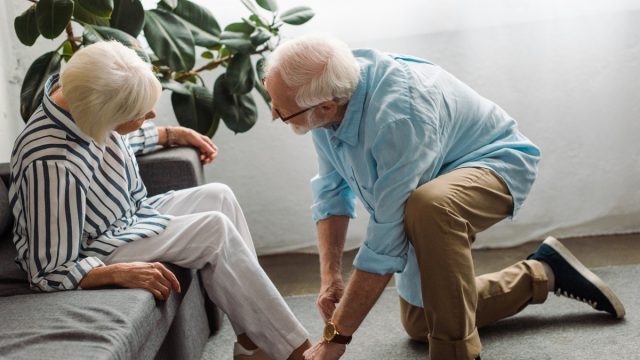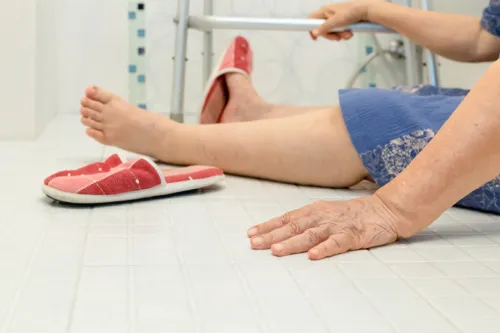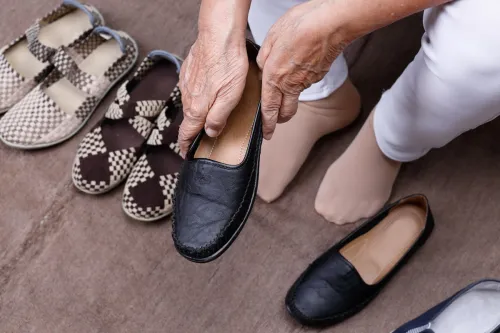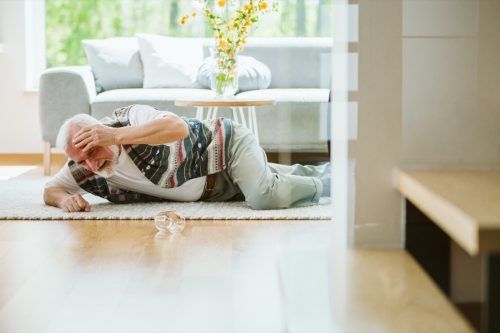If You’re Over 65, Never Wear This One Shoe, Experts Warn

Each year, millions of people over the age of 65 fall in the U.S., according to the Centers for Disease Control and Prevention (CDC). From vitamin deficiency to vision problems, there are a number of issues that make older adults more likely to experience falls. One of the biggest culprits, however, is poor footwear. In fact, experts say there is one type of shoe you should never wear if you’re over 65, as it’s the most likely to make you take a tumble. Read on to find out if your go-to shoe choice is actually dangerous.
RELATED: If You’re Over 65, You Shouldn’t Go Here Right Now, CDC Warns.
If you’re over 65, you shouldn’t wear loose slippers.

As we get older, we’re more likely to turn to comfy footwear, like loose house slippers. But this popular shoe option may not be good for our health overall. An oft-cited 1998 study conducted by Carol Frey, MD, a board-certified orthopedic surgeon and director of Orthopedic Foot and Ankle Surgery at West Coast Orthopedics in California, looked at the role shoes play in falls for older adults. According to Frey’s study, which included nearly 200 men and women over the age of 55, many of the fall-related injuries among those 65 and older were a result of the shoes they wore. Frey told The New York Times that older adults should avoid wearing slippers that are loose or ill-fitting, as this footwear most often resulted in falls.
RELATED: If You’re Over 65, Never Eat These 4 Foods, CDC Warns.
But wearing proper footwear can save you from a fall.

This doesn’t mean you should go barefoot in your home, however. A 2012 study from the Institute for Aging Research of Hebrew SeniorLife and MOBILIZE Boston observed more than 760 participants who were 64 years or older for more than two years, examining their footwear choices and frequency of falls. According to this study, more than 50 percent of the participants were barefoot, wearing socks without shoes, or wearing slippers at the time of their in-home falls.
Those who were shoeless or wearing slippers were also more than two times as likely to experience serious injury from their fall than those who were wearing other shoes at the time of their fall. “It may be advisable for older individuals to wear shoes in their home whenever possible to minimize the risk of falling,” the study authors state. Proper footwear could include well-fitting, low-heeled shoes with slip-resistant soles.
Falls are the leading cause of injury death for those over 65.

An individual over the age of 65 falls every second of every day in the U.S., “making falls the leading cause of injury and injury death in this age group,” according to the CDC. Out of the around 36 million falls among older adults each year, there are more than 32,000 deaths as a result. And even if death does not occur, one out of every five falls causes a severe injury, like broken bones or head damage. Falls are also the most common cause of hip fractures and traumatic brain injuries.
“Many people who fall, even if they’re not injured, become afraid of falling. This fear may cause a person to cut down on their everyday activities,” the CDC warns. “When a person is less active, they become weaker and this increases their chances of falling.”
RELATED: For more health content delivered straight to your inbox, sign up for our daily newsletter.
Falls are preventable, even among this age group.

Just because falling is more common as you age doesn’t mean it has to happen. According to the CDC, “falls are preventable and do not have to be an inevitable part of aging.” In order to help prevent falls, you should start by making your home safer. This includes “getting rid of trip hazards, keeping floors clutter free, adding grab bars in the bathroom, and having handrails and lights installed on all staircases,” per the CDC.
The agency also says you should have your feet checked and talk to your doctor about fall risks and prevention, as well as discuss proper footwear and whether or not you should be seeing a podiatrist. Make sure to also have your vision checked and stay active.
RELATED: If You’re Over 65, Never Do These 4 Things on a Hot Day, CDC Says.